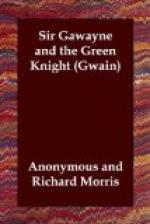1000 Derf men vpon dece drest of þe best.
[D] Þe olde auncian wyf he3est ho sytte3;
Þe lorde lufly her by lent, as I trowe;
[E] Gawan & þe gay burde to-geder þay seten,
1004 Euen in-mydde3, as þe messe metely come;
& syþen þur3 al þe sale, as hem best semed,
[F] Bi vche grome at his degre grayþely wat3 serued.
Þer wat3 mete, þer wat3 myrþe, þer wat3 much ioye,
1008 Þat for to telle þerof hit me tene were,
& to poynte hit 3et I pyned me parauenture;
[G] Bot 3et I wot þat Wawen & þe wale burde
Such comfort of her compaynye ca3ten to-geder,
1012 Þur3 her dere dalyaunce of her derne worde3,
Wyth clene cortays carp, closed fro fylþe;
& hor play wat3 passande vche prynce gomen,
in vayres;
1016 [H] Trumpe3 & nakerys,
Much pypyng þer repayres,
Vche mon tented hys,
& þay two tented þayres.
[Sidenote A: On Christmas morn,] [Sidenote B:
joy reigns in every dwelling in the world.] [Sidenote
C: So did it in the castle where our knight abode.]
[Sidenote D: The lord and “the old ancient
wife” sit together.] [Sidenote E: Gawayne
sits by the wife of his host.] [Sidenote F: It
were too tedious to tell of the meat, the mirth, and
the
joy that abounded everywhere.]
[Sidenote G: Gawayne and his beautiful companion
derive much comfort from
each other’s conversation.]
[Sidenote H: Trumpets and nakers give forth their
sounds.]
XXI.
1020 [A] Much dut wat3 þer dryuen þat day & þat oþer,
&
þe þryd as þro þronge in þerafter;
[B] Þe ioye of sayn
Ione3 day wat3 gentyle to here,
&
wat3 þe last of þe layk, leude3 þer þo3ten.
1024 Þer wer gestes to go vpon þe gray morne,
For-þy
wonderly þay woke, & þe wyn dronken,
Daunsed
ful dre3ly wyth dere carole3;
[C] At þe last, when
hit wat3 late, þay lachen her leue,
1028 Vchon to wende on his way, þat wat3 wy3e
stronge.
Gawan
gef hym god-day, þe god mon hym lachche3,
Ledes
hym to his awen chambre, þ[e] chymne bysyde,
[D] & þere he dra3e3
hym on-dry3e, & derely hym þonkke3,
1032 Of þe wynne worschip &[1] he hym wayned hade,
As
to honour his hous on þat hy3e tyde,
&
enbelyse his bur3 with his bele chere.
“I-wysse
sir, quyl I leue, me worþe3 þe better,
1036 Þat Gawayn hat3 ben my gest, at Godde3 awen
fest.” [Fol. 105.]
“Grant
merci[2] sir,” quod Gawayn, “in god fayth
hit is yowre3,
Al
þe honour is your awen, þe he3e kyng yow 3elde;
&
I am wy3e at your wylle, to worch youre hest,
1040 As I am halden þer-to, in hy3e & in lo3e,
bi
ri3t.”
[E] Þe lorde fast
can hym payne,
To
holde lenger þe kny3t,
1044 To hym answre3 Gawayn,
Bi
non way þat he my3t.




